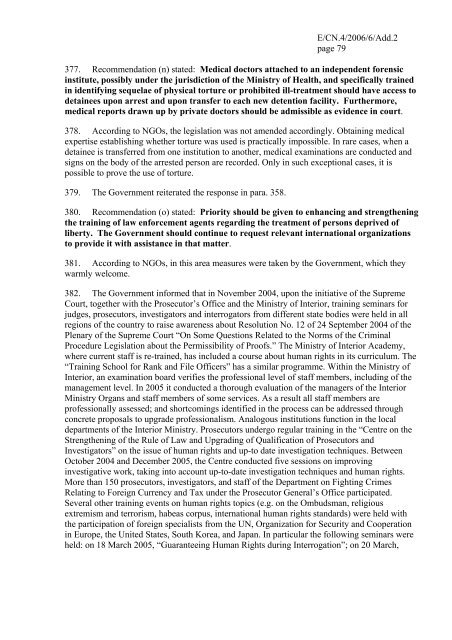E Economic and Social Council - acnudh
E Economic and Social Council - acnudh
E Economic and Social Council - acnudh
You also want an ePaper? Increase the reach of your titles
YUMPU automatically turns print PDFs into web optimized ePapers that Google loves.
E/CN.4/2006/6/Add.2<br />
page 79<br />
377. Recommendation (n) stated: Medical doctors attached to an independent forensic<br />
institute, possibly under the jurisdiction of the Ministry of Health, <strong>and</strong> specifically trained<br />
in identifying sequelae of physical torture or prohibited ill-treatment should have access to<br />
detainees upon arrest <strong>and</strong> upon transfer to each new detention facility. Furthermore,<br />
medical reports drawn up by private doctors should be admissible as evidence in court.<br />
378. According to NGOs, the legislation was not amended accordingly. Obtaining medical<br />
expertise establishing whether torture was used is practically impossible. In rare cases, when a<br />
detainee is transferred from one institution to another, medical examinations are conducted <strong>and</strong><br />
signs on the body of the arrested person are recorded. Only in such exceptional cases, it is<br />
possible to prove the use of torture.<br />
379. The Government reiterated the response in para. 358.<br />
380. Recommendation (o) stated: Priority should be given to enhancing <strong>and</strong> strengthening<br />
the training of law enforcement agents regarding the treatment of persons deprived of<br />
liberty. The Government should continue to request relevant international organizations<br />
to provide it with assistance in that matter.<br />
381. According to NGOs, in this area measures were taken by the Government, which they<br />
warmly welcome.<br />
382. The Government informed that in November 2004, upon the initiative of the Supreme<br />
Court, together with the Prosecutor’s Office <strong>and</strong> the Ministry of Interior, training seminars for<br />
judges, prosecutors, investigators <strong>and</strong> interrogators from different state bodies were held in all<br />
regions of the country to raise awareness about Resolution No. 12 of 24 September 2004 of the<br />
Plenary of the Supreme Court “On Some Questions Related to the Norms of the Criminal<br />
Procedure Legislation about the Permissibility of Proofs.” The Ministry of Interior Academy,<br />
where current staff is re-trained, has included a course about human rights in its curriculum. The<br />
“Training School for Rank <strong>and</strong> File Officers” has a similar programme. Within the Ministry of<br />
Interior, an examination board verifies the professional level of staff members, including of the<br />
management level. In 2005 it conducted a thorough evaluation of the managers of the Interior<br />
Ministry Organs <strong>and</strong> staff members of some services. As a result all staff members are<br />
professionally assessed; <strong>and</strong> shortcomings identified in the process can be addressed through<br />
concrete proposals to upgrade professionalism. Analogous institutions function in the local<br />
departments of the Interior Ministry. Prosecutors undergo regular training in the “Centre on the<br />
Strengthening of the Rule of Law <strong>and</strong> Upgrading of Qualification of Prosecutors <strong>and</strong><br />
Investigators” on the issue of human rights <strong>and</strong> up-to date investigation techniques. Between<br />
October 2004 <strong>and</strong> December 2005, the Centre conducted five sessions on improving<br />
investigative work, taking into account up-to-date investigation techniques <strong>and</strong> human rights.<br />
More than 150 prosecutors, investigators, <strong>and</strong> staff of the Department on Fighting Crimes<br />
Relating to Foreign Currency <strong>and</strong> Tax under the Prosecutor General’s Office participated.<br />
Several other training events on human rights topics (e.g. on the Ombudsman, religious<br />
extremism <strong>and</strong> terrorism, habeas corpus, international human rights st<strong>and</strong>ards) were held with<br />
the participation of foreign specialists from the UN, Organization for Security <strong>and</strong> Cooperation<br />
in Europe, the United States, South Korea, <strong>and</strong> Japan. In particular the following seminars were<br />
held: on 18 March 2005, “Guaranteeing Human Rights during Interrogation”; on 20 March,
















